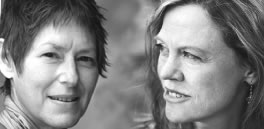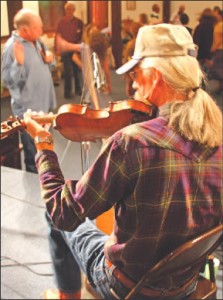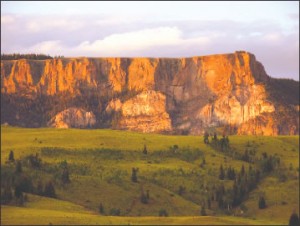by Jennifer Dempsey
Thirteen years ago, the Academy of American Poets established April as National Poetry Month. During this month,?poets and poetry lovers?everywhere celebrate the art form that, writer David Ignatow claims,?“almost makes up for the estrangement?among the human race.”
Central Colorado is home to hundreds of remarkable poets and in?honor of?National Poetry Month?a few?reveal what makes them tick.?

Poets can’t help themselves,” said Salida poet Jessica Saunders,?who has been writing since she was 11 years old.? “Many of us, me at least, think in poetry and rhyme.? So almost? anything we write comes out as a poem.? Also, like visual artists, we see the world a bit differently.? We also like to play with the dictionary meanings and the connotations of words.? Here’s a quick verse I wrote when my life had just been turned upside down.”
TRAVESTY
My life is all filled with a brilliant white light
My heart is as free as a bird
My significant other walked out last night.
Yes, love is a four letter word.
“Pretty much anything and everything makes me write poetry,” said?Lynda?LaRocca, a?poet from Twin Lakes who has been writing since second grade. “Sometimes I’m intrigued by a single word, and I’ll fashion a poem around that word.?Other times, I want to experiment with a specific form and so I’ll come up with a?topic that sees to suit that form.? Usually, though,?I write poetry as a way to fathom the world.? Poetry lets me?connect my own soul and my own experiences with the souls and experiences of others. It’s?a way to empathize, share, and?reflect on the human condition.”
For Salida poet Lawton Eddy it’s “an unlikely combination of words popping into my head (that) might make me run to pen and paper. Example: Autumn ice, that invisible chill that makes perfect prediction…”?
A writer of poetry since she was eight years old, Eddy?explained, “It’s not so much a decision to be a poet as it is the way I hear words. They have a cadence and a rhythm.?And my mind filters words away, leaving only those that vibrate.?Putting those vibrating words together is like hitting a tuning fork – they cut through to the deepest place where we not only hear but simultaneously feel.”
“Before a poem comes, I often scratch,” said Rosemerry Wahtola Trommer from Placerville. “I find great pleasure in the searching for a poem. It involves paying attention with a purpose. This might mean going for a walk and choosing to notice the creaminess of the yucca flower or the cracks in the dried mud or the smell of the river bottom. It may mean taking a drive and trying to articulate the thoughts that stream through the unfenced field of the mind. Or it may mean reading another book or poem and finding myself enthralled with a turn of phrase or word. Seeking the poetic seed is its own pleasure, but the thrill comes in marrying all these scratchings. What jazzes me is finding the place where disparate ideas and images constellate.”
“Poetry is every moment that hides in the interstices of every other moment,” explained Salida poet Barbara Ford.?“It’s the only?cradle that rocks me, and it’s?the forgotten toast leaping out of the toaster, demanding to be buttered. I?turned to writing when my drawings were deemed too detailed. Poetry hasn’t scolded me yet for noticing things I’m not supposed to.”
Westcliffe poet Joyce Gregor has been writing poetry since first grade. She describes in her poem, A Contribution:
“Poets come to life by grace, and leave —
Dropping rose petals,
on scarlet, gold, and russet leaves of season’s end.
It is a gift they bring,
a fragrance,
pressed between the pages.”
Ed Berg, Salida poet and photographer, describes poetry as “the beachfront property?that lies between the land of essays and novels, and the ocean of graphic?images. It is the walker who strides with one foot in the other-world of spirit, and here-now world of this afternoon’s tax returns and trash removal. That’s why I write poetry and essays and take photographs.”?
Salida sixth grader Melody Brood has been writing?since?she was eight years old.
“When I am in a bad mood I have to write more than I do when I am in a good mood,” she said. “I need to write when I am having either?a really good day or really bad day … like when a teacher?gives a good grade or when a kid in my class gives me a really hard time. If I was having a normal day, I wouldn’t need to write.”
Last year?Brood’s poem, The Girl, was published in A Celebration of?Poets, a national collection of young person’s poetry.
“That made me feel like I am not just writing?for me, but for others to understand and enjoy,”?she said.
Salida poet John Skinner said, “I’m not sure exactly what it is for every one but I know it doesn’t take much for me. I rhyme compulsively.?I’ve been doing it since I was ten or eleven, I’m 63 now.”
From his poem, What Makes a Poet Tick, Skinner writes:
Jennifer Dempsey is a freelance writer based in Salida and director of the Salida Circus: info@salidacircus.com.Putting words to events
That record and make sense
That provide a mnemonic
In syllables phonic
And create latent images
of actions and visages
Others can see, remember and know
Without the necessity of having to go
Through time or through space
To try reaching the place
That the poet has seen
Never having been.
Capturing essences,
passing on message?
From creatures and times
With phrases and rhymes
Because of a gift, a blessing, a curse
That causes a poet to interpret life in verse.




